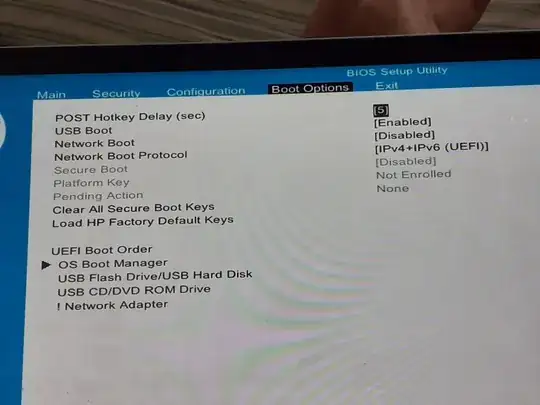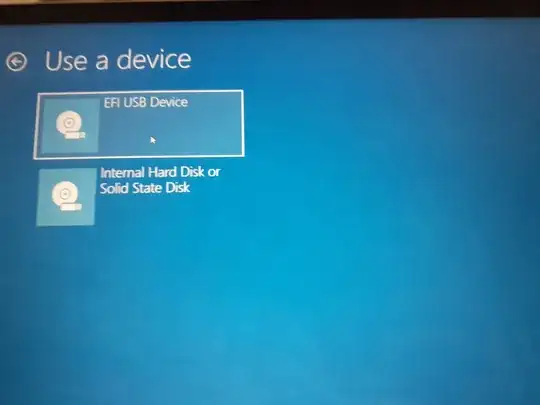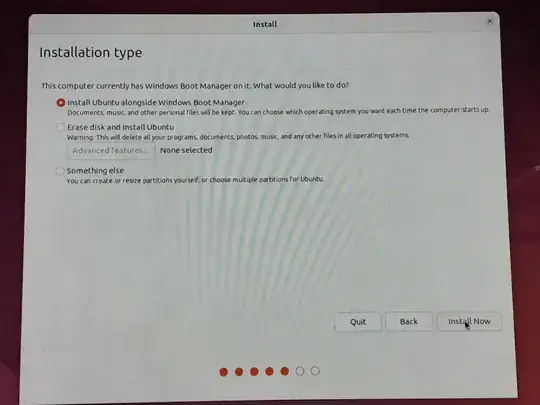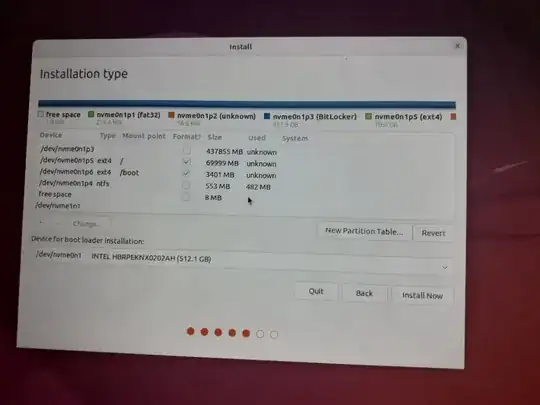I am trying to dual boot my HP envy x360 with 512 GBs of SSD and Windows 10 Home already installed. I created a bootable USB using Rufus and put Ubuntu 22.04 on it.
I also disabled Secure Boot from my BIOS settings.
BIOS Boot Options:
I disabled bitlocker and decrypted my C drive, I also shrank the C drive to create some unallocated space.
I have the following storage controllers: !device manager showing RST storage controllers
I then rebooted my laptop from the USB using the "change advanced startup options" of windows, I will include the steps below:
(I chose the "EFI USB device option")
I then chose the "Install Ubuntu" option and chose normal installation. When asked where to install Ubuntu, I chose the Install Ubuntu alongside Windows Boot Manager option:
The installation started and the progress bar was filled until near the end, when I got this Error: Unable to install GRUB in /dev/nvme0n1: executing 'grub-install /dev/nvme0n1' failed. this is a fatal error.
I was asked to restart the computer, after which windows was loaded.
Other ways I have tried:
- I chose the "something else" option on the installation type and mounted 3 GBs as the /root directory and mounted the rest of the free space I had created on windows as the root (/) directory. the rest of the options were left unchanged, this is a picture of the partitioning screen.
After trying to install, I got the same error as before, but Ubuntu was installed on my drive as the next time I tried to run the installer, I was given the option to Erase and reinstall Ubuntu.
I again chose the "something else" option and this time only the / directory to the free space and set the "Device for bootloader installation" to the partition marked as "Windows Boot Manager". I tried installing again and got the same error.
I burned another version (Ubuntu 20.04) onto the USB and tried installing using the Something else option and got the same error.
I would be glad to share any info/screenshots that would clarify the problem.
I got a Boot Info Summary using Boot-Repair and got this pastebin: https://paste.ubuntu.com/p/DZdJGBshsP/
============================== Boot Info Summary ===============================
=> Grub2 (v2.00) is installed in the MBR of /dev/sda and looks at sector 1 of
the same hard drive for core.img. core.img is at this location and looks
for (hd0,msdos1)/boot/grub. It also embeds following components:
modules
---------------------------------------------------------------------------
biosdisk fshelp fat exfat ext2 ntfs ntfscomp part_msdos
---------------------------------------------------------------------------
sda1: __________________________________________________________________________
File system: vfat
Boot sector type: MSWIN4.1: FAT32
Boot sector info: No errors found in the Boot Parameter Block.
Operating System:
Boot files: /boot/grub/grub.cfg /efi/boot/bootx64.efi
/efi/boot/grubx64.efi /efi/boot/mmx64.efi
md/imsm0: ______________________________________________________________________
File system:
Boot sector type: Unknown
Boot sector info:
================================ 2 OS detected =================================
OS#1: Windows 10 or 11 on nvme0n1p3
OS#2: Ubuntu 22.04 LTS on nvme0n1p5
================================ Host/Hardware =================================
CPU architecture: 64-bit
Video: CometLake-U GT2 [UHD Graphics] GP108M [GeForce MX330] from Intel Corporation NVIDIA Corporation
Live-session OS is Ubuntu 64-bit (Ubuntu 22.04 LTS, jammy, x86_64)
===================================== UEFI =====================================
BIOS/UEFI firmware: F.24(15.24) from Insyde
The firmware is EFI-compatible, and is set in EFI-mode for this live-session.
SecureBoot disabled - SecureBoot disabled
Platform is in Setup Mode - Please report this message to [email protected].
BootCurrent: 0000
Timeout: 0 seconds
BootOrder: 0001,2001,3001,2002,2004
Boot0000* USB Hard Drive (UEFI) - General USB Flash Disk (General USB Flash Disk) PciRoot(0x0)/Pci(0x14,0x0)/USB(0,0)/HD(1,MBR,0x18d8d7,0x800,0x1dd9000)RC
Boot0001* Windows Boot Manager HD(1,GPT,14b3b884-38b7-4d46-93f7-ea16b411282c,0x800,0x82000)/File(\EFI\Microsoft\Boot\bootmgfw.efi)WINDOWS.........x...B.C.D.O.B.J.E.C.T.=.{.9.d.e.a.8.6.2.c.-.5.c.d.d.-.4.e.7.0.-.a.c.c.1.-.f.3.2.b.3.4.4.d.4.7.9.5.}....................
Boot2001* EFI USB Device RC
Boot3001* Internal Hard Disk or Solid State Disk RC
de3ee3ac3e402dfb9f2cb2b38d215225 nvme0n1p1/Boot/bootx64.efi
d9c4ec54a5e4fff17ea5ca059dee9416 nvme0n1p1/HP/BIOSUpdate/BiosMgmt32.efi
659a6171d178c951211c4868fccbfa9b nvme0n1p1/HP/BIOSUpdate/BiosMgmt.efi
1b8c0684ede8539ccc205cf7a750eca3 nvme0n1p1/HP/BIOSUpdate/CryptRSA32.efi
6488d391f74263c9da3c3d47dffa6212 nvme0n1p1/HP/BIOSUpdate/CryptRSA.efi
6d6c99b06136830bbc041fe57b04f658 nvme0n1p1/HP/BIOSUpdate/HpBiosMgmt.efi
6488d391f74263c9da3c3d47dffa6212 nvme0n1p1/HP/SystemDiags/CryptRSA.efi
9ca774eb2290dce4f276eaec4aced423 nvme0n1p1/HP/SystemDiags/SysDiags.efi
72293f4ecf0f5b24dce601d2c3c4b26e nvme0n1p1/Microsoft/Boot/bootmgfw.efi
75641ea3cae97c7ea935e501d6e5e227 nvme0n1p1/Microsoft/Boot/bootmgr.efi
============================= Drive/Partition Info =============================
Disks info: ____________________________________________________________________
nvme0n1 : is-GPT, no-BIOSboot, has---ESP, not-usb, not-mmc, has-os, has-win, 2048 sectors * 512 bytes
nvme1n1 : notGPT, no-BIOSboot, has-noESP, not-usb, not-mmc, no-os, no-wind, 2048 sectors * 512 bytes
Partitions info (1/3): _________________________________________________________
nvme0n1p1 : no-os, 32, nopakmgr, no-docgrub, nogrub, nogrubinstall, no-grubenv, noupdategrub, not-far
nvme0n1p3 : is-os, 32, nopakmgr, no-docgrub, nogrub, nogrubinstall, no-grubenv, noupdategrub, farbios
nvme0n1p4 : no-os, 32, nopakmgr, no-docgrub, nogrub, nogrubinstall, no-grubenv, noupdategrub, farbios
nvme0n1p5 : is-os, 64, apt-get, signed grub-pc grub-efi , grub2, grub-install, grubenv-ok, update-grub, farbios
Partitions info (2/3): _________________________________________________________
nvme0n1p1 : is---ESP, part-has-no-fstab, no-nt, no-winload, no-recov-nor-hid, no-bmgr, notwinboot
nvme0n1p3 : isnotESP, part-has-no-fstab, no-nt, haswinload, no-recov-nor-hid, no-bmgr, notwinboot
nvme0n1p4 : isnotESP, part-has-no-fstab, no-nt, no-winload, recovery-or-hidden, no-bmgr, notwinboot
nvme0n1p5 : isnotESP, fstab-has-goodEFI, no-nt, no-winload, no-recov-nor-hid, no-bmgr, notwinboot
Partitions info (3/3): _________________________________________________________
nvme0n1p1 : not--sepboot, no---boot, part-has-no-fstab, not-sep-usr, no---usr, part-has-no-fstab, no--grub.d, nvme0n1
nvme0n1p3 : not--sepboot, no---boot, part-has-no-fstab, not-sep-usr, no---usr, part-has-no-fstab, no--grub.d, nvme0n1
nvme0n1p4 : not--sepboot, no---boot, part-has-no-fstab, not-sep-usr, no---usr, part-has-no-fstab, no--grub.d, nvme0n1
nvme0n1p5 : not--sepboot, with-boot, fstab-without-boot, not-sep-usr, with--usr, fstab-without-usr, std-grub.d, nvme0n1
fdisk -l (filtered): ___________________________________________________________
Disk nvme0n1: 476.94 GiB, 512110190592 bytes, 1000215216 sectors
Disk identifier: 9B6B322A-E01A-48C4-BAA5-86025779ADA6
Start End Sectors Size Type
nvme0n1p1 2048 534527 532480 260M EFI System
nvme0n1p2 534528 567295 32768 16M Microsoft reserved
nvme0n1p3 567296 855754751 855187456 407.8G Microsoft basic data
nvme0n1p4 999116800 1000198143 1081344 528M Windows recovery environment
nvme0n1p5 855754752 999116799 143362048 68.4G Linux filesystem
Partition table entries are not in disk order.
Disk nvme1n1: 27.25 GiB, 29260513280 bytes, 57149440 sectors
Disk sda: 14.92 GiB, 16025387008 bytes, 31299584 sectors
Disk identifier: 0x0018d8d7
Boot Start End Sectors Size Id Type
sda1 * 2048 31299583 31297536 14.9G c W95 FAT32 (LBA)
parted -lm (filtered): _________________________________________________________
sda:16.0GB:scsi:512:512:msdos:General USB Flash Disk:;
1:1049kB:16.0GB:16.0GB:fat32::boot, lba;
nvme0n1:512GB:nvme:512:512:gpt:INTEL HBRPEKNX0202AH:;
1:1049kB:274MB:273MB:fat32:EFI system partition:boot, esp;
2:274MB:290MB:16.8MB::Microsoft reserved partition:msftres;
3:290MB:438GB:438GB:ntfs:Basic data partition:msftdata;
5:438GB:512GB:73.4GB:ext4::;
4:512GB:512GB:554MB:ntfs:Basic data partition:hidden, diag;
nvme1n1:29.3GB:nvme:512:512:unknown:INTEL HBRPEKNX0202AHO:;
blkid (filtered): ______________________________________________________________
NAME FSTYPE UUID PARTUUID LABEL PARTLABEL
sda
└─sda1 vfat 706B-8706 0018d8d7-01 UBUNTU 22_0
nvme0n1 isw_raid_member
├─nvme0n1p1 vfat B439-C902 14b3b884-38b7-4d46-93f7-ea16b411282c SYSTEM EFI system partition
├─nvme0n1p2 0d52444b-83ce-4acc-9ad6-e9d1793b3caf Microsoft reserved partition
├─nvme0n1p3 ntfs D072752072750C8A 4a6dbb08-0a42-4e83-93c8-575223ff2e5e Windows Basic data partition
├─nvme0n1p4 ntfs B4A21A18A219E022 f8471a8e-ada5-4520-865b-7de240c6cbf4 Windows RE tools Basic data partition
└─nvme0n1p5 ext4 7a62fc8e-de21-4c0f-8850-2fa855cf0c02 d7f44e53-cab5-458b-a31e-aebab9ef178a
nvme1n1 isw_raid_member
└─md127
Mount points (filtered): _______________________________________________________
Avail Use% Mounted on
/dev/nvme0n1p1 173.7M 32% /mnt/boot-sav/nvme0n1p1
/dev/nvme0n1p3 134.7G 67% /mnt/boot-sav/nvme0n1p3
/dev/nvme0n1p4 67.7M 87% /mnt/boot-sav/nvme0n1p4
/dev/nvme0n1p5 54.8G 13% /target
/dev/sda1 11.5G 23% /cdrom
Mount options (filtered): ______________________________________________________
/dev/nvme0n1p1 vfat ro,relatime,fmask=0022,dmask=0022,codepage=437,iocharset=iso8859-1,shortname=mixed,errors=remount-ro
/dev/nvme0n1p3 fuseblk rw,relatime,user_id=0,group_id=0,allow_other,blksize=4096
/dev/nvme0n1p4 fuseblk rw,relatime,user_id=0,group_id=0,allow_other,blksize=4096
/dev/nvme0n1p5 ext4 rw,relatime,errors=remount-ro
/dev/sda1 vfat ro,noatime,fmask=0022,dmask=0022,codepage=437,iocharset=iso8859-1,shortname=mixed,errors=remount-ro
====================== sda1/boot/grub/grub.cfg (filtered) ======================
Try or Install Ubuntu
Ubuntu (safe graphics)
OEM install (for manufacturers)
Boot from next volume
UEFI Firmware Settings
Test memory
==================== sda1: Location of files loaded by Grub ====================
GiB - GB File Fragment(s)
?? = ?? boot/grub/grub.cfg 1
=================== blkid (filtered) before raid activation ====================
/dev/nvme0n1p1: LABEL="SYSTEM" UUID="B439-C902" BLOCK_SIZE="512" TYPE="vfat" PARTLABEL="EFI system partition" PARTUUID="14b3b884-38b7-4d46-93f7-ea16b411282c"
/dev/nvme0n1p3: LABEL="Windows" BLOCK_SIZE="512" UUID="D072752072750C8A" TYPE="ntfs" PARTLABEL="Basic data partition" PARTUUID="4a6dbb08-0a42-4e83-93c8-575223ff2e5e"
/dev/nvme0n1p4: LABEL="Windows RE tools" BLOCK_SIZE="512" UUID="B4A21A18A219E022" TYPE="ntfs" PARTLABEL="Basic data partition" PARTUUID="f8471a8e-ada5-4520-865b-7de240c6cbf4"
/dev/nvme0n1p5: UUID="7a62fc8e-de21-4c0f-8850-2fa855cf0c02" BLOCK_SIZE="4096" TYPE="ext4" PARTUUID="d7f44e53-cab5-458b-a31e-aebab9ef178a"
/dev/nvme1n1: TYPE="isw_raid_member"
/dev/sda1: LABEL="UBUNTU 22_0" UUID="706B-8706" BLOCK_SIZE="512" TYPE="vfat" PARTUUID="0018d8d7-01"
/dev/nvme0n1p2: PARTLABEL="Microsoft reserved partition" PARTUUID="0d52444b-83ce-4acc-9ad6-e9d1793b3caf"
==================================== dmraid ====================================
dmraid -si -c
no block devices found
dmraid -ay:
no block devices found
dmraid -sa -c:
no block devices found
==================================== mdadm =====================================
mdadm --assemble --scan
mdadm --detail --scan
ARRAY /dev/md/imsm0 metadata=imsm UUID=d4920e23:0470b5fb:00ee1f05:61a19535
Suggested repair: ______________________________________________________________
The default repair of the Boot-Repair utility would purge (in order to enable-raid) and reinstall the grub-efi of
nvme0n1p5,
using the following options: nvme0n1p1/boot/efi
Additional repair would be performed: unhide-bootmenu-10s use-standard-efi-file
Blockers in case of suggested repair: __________________________________________
/target detected. Please close the Ubuntu installer, then retry.
Final advice in case of suggested repair: ______________________________________
Please do not forget to make your UEFI firmware boot on the Ubuntu 22.04 LTS entry (nvme0n1p1/efi/**/grub.efi (** will be updated in the final message) file) !
If your computer reboots directly into Windows, try to change the boot order in your UEFI firmware.
If your UEFI firmware does not allow to change the boot order, change the default boot entry of the Windows bootloader.
For example you can boot into Windows, then type the following command in an admin command prompt:
bcdedit /set {bootmgr} path \EFI**\grub.efi (** will be updated in the final message)





